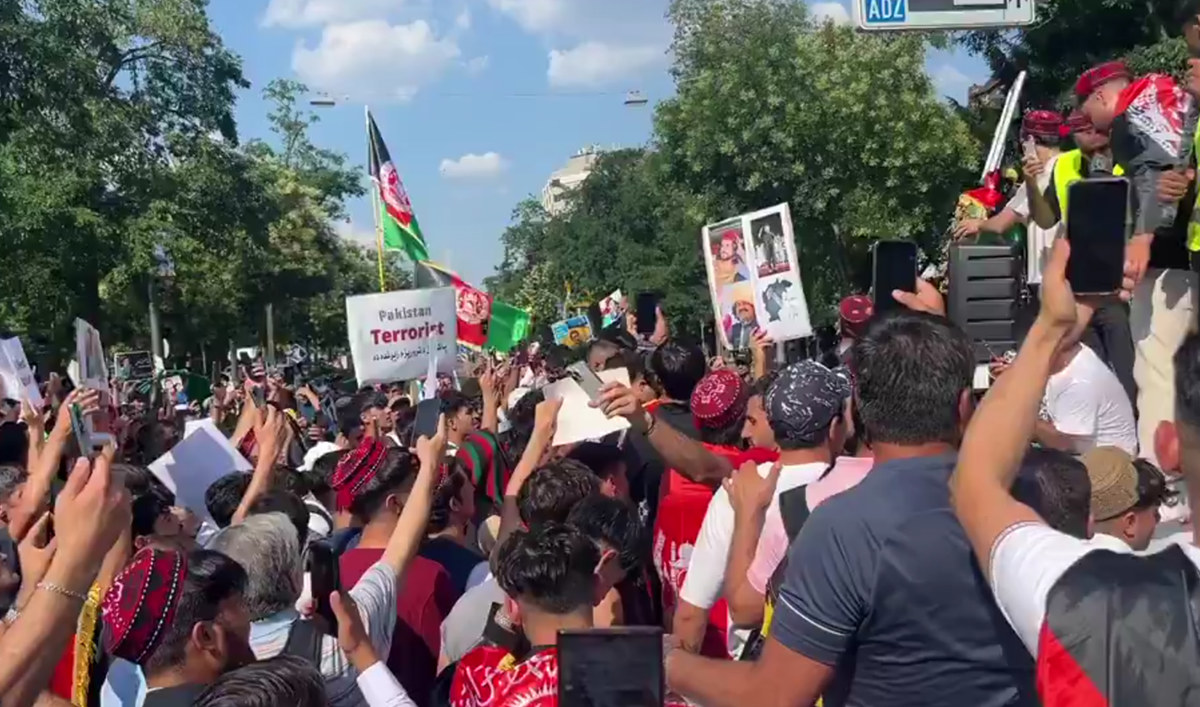ISLAMABAD: Pakistan’s Foreign Office on Sunday summoned Germany’s ambassador to Islamabad, Alfred Grannas, and conveyed its concerns about an attack on its Frankfurt consulate by what it said was a “gang of extremists.”
Footage on social media from Saturday showed a large crowd of angry people carrying Afghanistan’s national flag, jumping the fence into the Pakistan consulate in Frankfurt and taking down Pakistan’s flag.
As per various Pakistani media reports, the people were reportedly Afghan nationals who pelted the consulate with stones during their protest.
“We have conveyed our serious concerns [over the attack on Pakistan’s consulate in Frankfurt],” Foreign Office spokesperson Mumtaz Zahra Baloch said in a statement.
The spokesperson earlier condemned the attack and urged German authorities to take action and arrest those involved in the incident.
“Pakistan strongly condemns yesterday’s attack by a gang of extremists on its consulate in Frankfurt, Germany and the failure of the German authorities to protect the sanctity and security of the premises of its consular Mission,” Baloch said.
Under the Vienna Convention 1963, Baloch stressed, it was the responsibility of the host country to protect the sanctity of the consular premises and ensure the security of diplomats.

Demonstrators stage a protest outside the Pakistan consulate in Frankfurt on July 21, 2024. (Photo courtesy: X/@SaleemzebAf)
“In yesterday’s incident, the security of Pakistan’s consulate in Frankfurt was breached, endangering the lives of its consular staff,” she said. “We are conveying our strong protest to the German Government.”
The spokesperson urged the German government to ensure the security of Pakistan’s diplomatic missions and staff in Germany.
“We also urge the German authorities to take immediate measures to arrest and prosecute those involved in yesterday’s incident and hold to account those responsible for the lapses in security,” she said.
In a separate message on social media platform X, Pakistan’s embassy in Germany called on the people to remain “patient and calm” after the incident.
PAKISTAN-AFGHANISTAN TENSIONS
Tensions between Pakistan and Afghanistan have steadily increased since the Afghan Taliban seized Kabul in August 2021. Pakistan has witnessed a surge in militant attacks on its soil since November 2022 after a fragile truce between Islamabad and the Pakistani Taliban, or the Tehreek-e-Taliban Pakistan (TTP) outfit broke down.
Pakistan blames Afghanistan for sheltering TTP militants and has asked Kabul to take action against them. However, Afghanistan denies the allegations and has warned Pakistan against carrying out its threats of conducting cross-border attacks in Afghanistan.
Tensions between both countries escalated further in March this year after Pakistan struck alleged militant targets inside Afghanistan. Kabul said the strikes killed three women and three children.
Ties between the two countries also took a hit after Pakistan last year launched a deportation drive to expel undocumented foreigners from its country, which mainly targeted Afghan nationals.
Over 600,000 Afghan nationals have since last year left Pakistan and returned to their country, which they had left over the past couple of decades due to war and persecution.

















